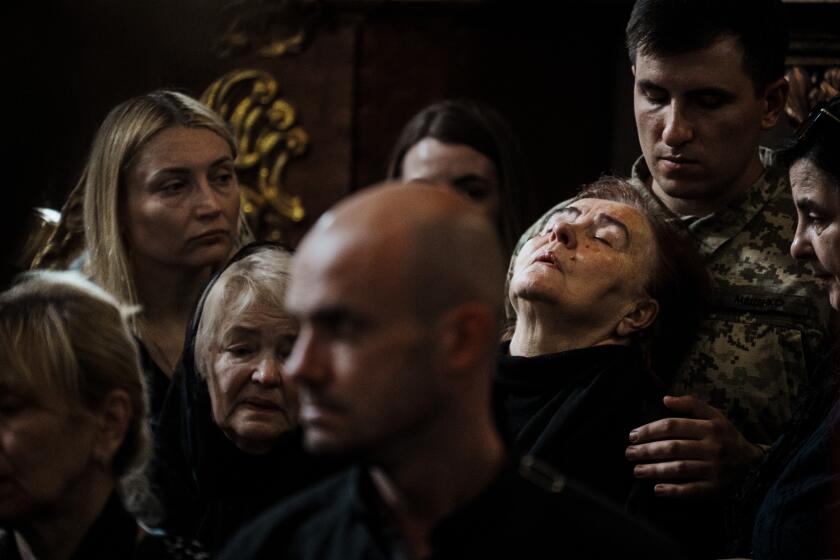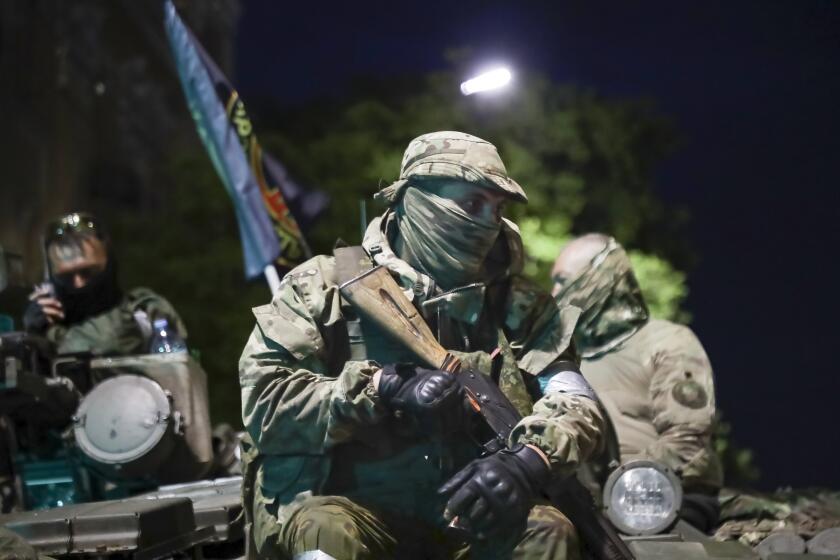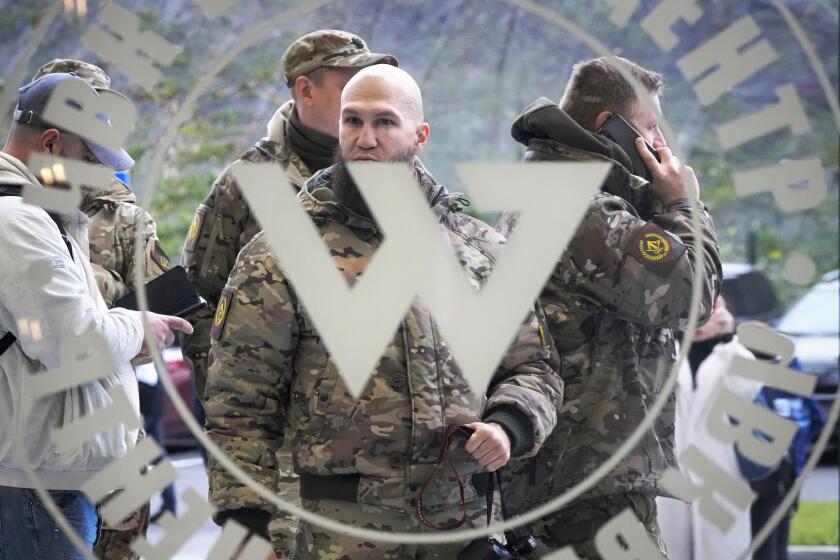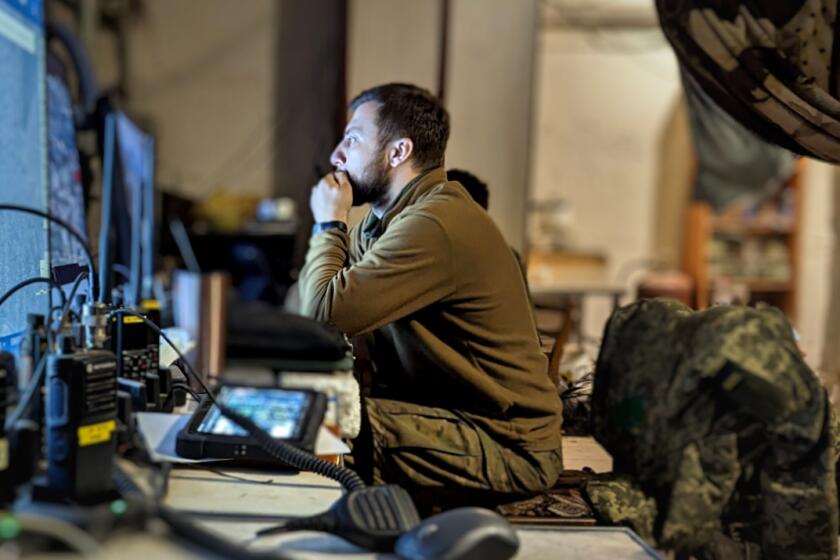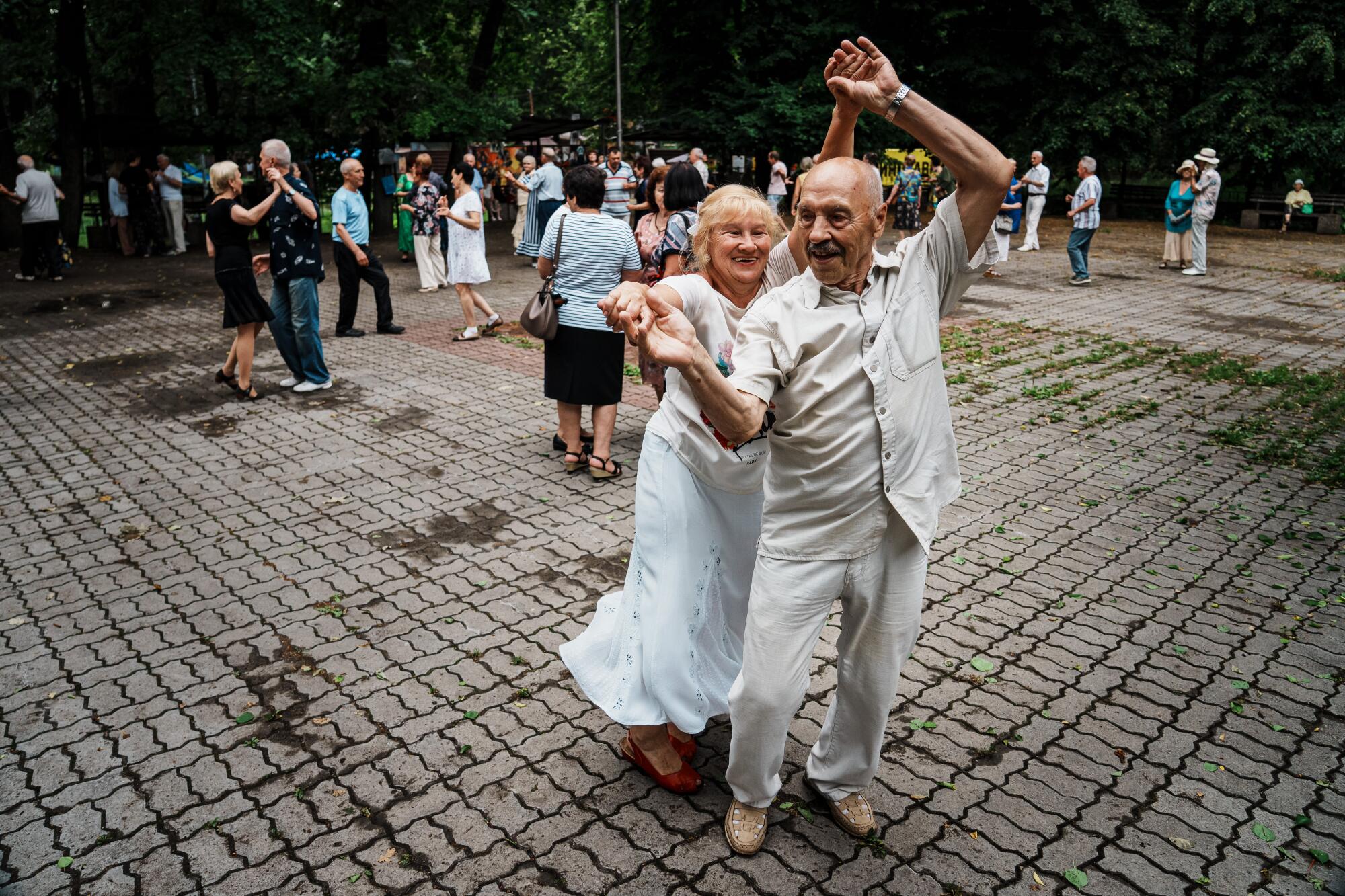
- Share via
KYIV, Ukraine — In some cultures, people greet one another by asking: “Have you eaten?” In Ukraine’s wartime capital, the question is more likely to be a wry, “Getting any sleep?”
More than 16 months after Russia launched its full-scale invasion, wailing air alerts routinely pierce the late-night and predawn hours, followed by the thunder of air defenses at work against incoming waves of missiles and drones in the skies over this city of some 3 million people.
In May and June, more than 200 Russian projectiles were shot down over the capital region, Ukrainian officials said. With the relentless pace of attacks, a full night of sound slumber is something to dream about — a rare treat, a treasure so often tantalizingly out of reach.
Kyiv, which resisted Russia’s early onslaught of ground forces, is hundreds of miles from the current front lines, and people here tend to depict their own forced wakefulness as a far lesser ordeal than the battlefield conditions faced by the country’s defenders or the perils of life in Russian-occupied cities and towns.
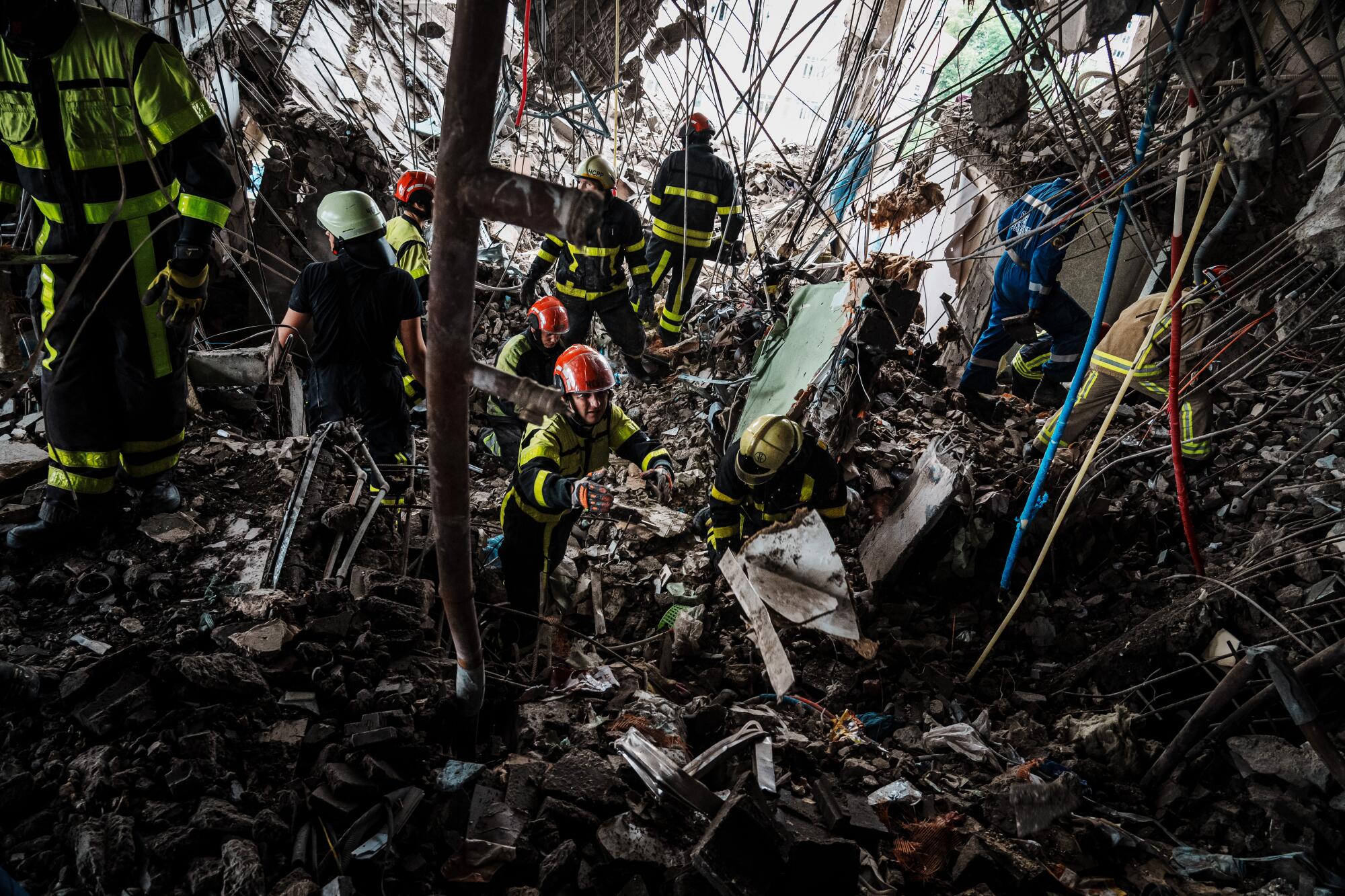
But the noisy alerts reflect real danger. On a Saturday in June, five people were killed when falling debris from an intercepted missile hit a multistory building in Kyiv, incinerating parts of two floors and sending chunks of masonry plummeting into stairwells and the courtyard.
Closer to the front lines, civilians as well as soldiers are at constant risk. On June 27, Russian Iskander missiles struck a popular restaurant in the eastern city of Kramatorsk at the dinner hour, resulting in the deaths of at least 13 people, including four children and a prominent young Ukrainian novelist. Dozens of others were injured.
“You don’t want to dwell on it all the time, the possibility of a missile coming for you,” said Larisa Lapshina, a 65-year-old Kyiv resident. “But you’d be crazy not to worry about it. And when you worry about it, you can’t sleep.”
::
Sleep deprivation, mental health experts say, is both cause and consequence of long-term stress, to be taken seriously in either event. Traditionally, however, Ukraine is not a place where psychological well-being is openly discussed.
“People here tend to think they should just be able to cope on their own,” said Alyona Gerasimova, a public health project director in Ukraine for the U.S. Agency for International Development.
Seeking to dispel lingering stigma associated with mental health support, the government has put a premium on community-based initiatives to promote emotional resilience.
Even far from Ukraine’s front lines, military funerals set off waves of mourning. ‘You can’t see an end to it,’ one chaplain says as the war drags on.
For those in certain professions, stress is a way of life, even if carefully hidden behind a calm facade.
Oleksandr Ratiev, a shift commander at a firefighting and emergency services base in northwest Kyiv, said that after one recent predawn strike, a frightened family realized that part of a downed drone had crash-landed on their roof.
“Everyone was on the street in their nightclothes, and everyone was scared — they were afraid the warhead would explode,” Ratiev said. “You have to be able to look them in the eye, calmly, and tell them it’s going to be OK.”
His crew of seven swiftly assessed the damage, summoned the bomb squad and purposefully distracted the couple’s two boys, about 4 and 8, by showing off their trucks and gear. The smoldering wreckage was safely removed.
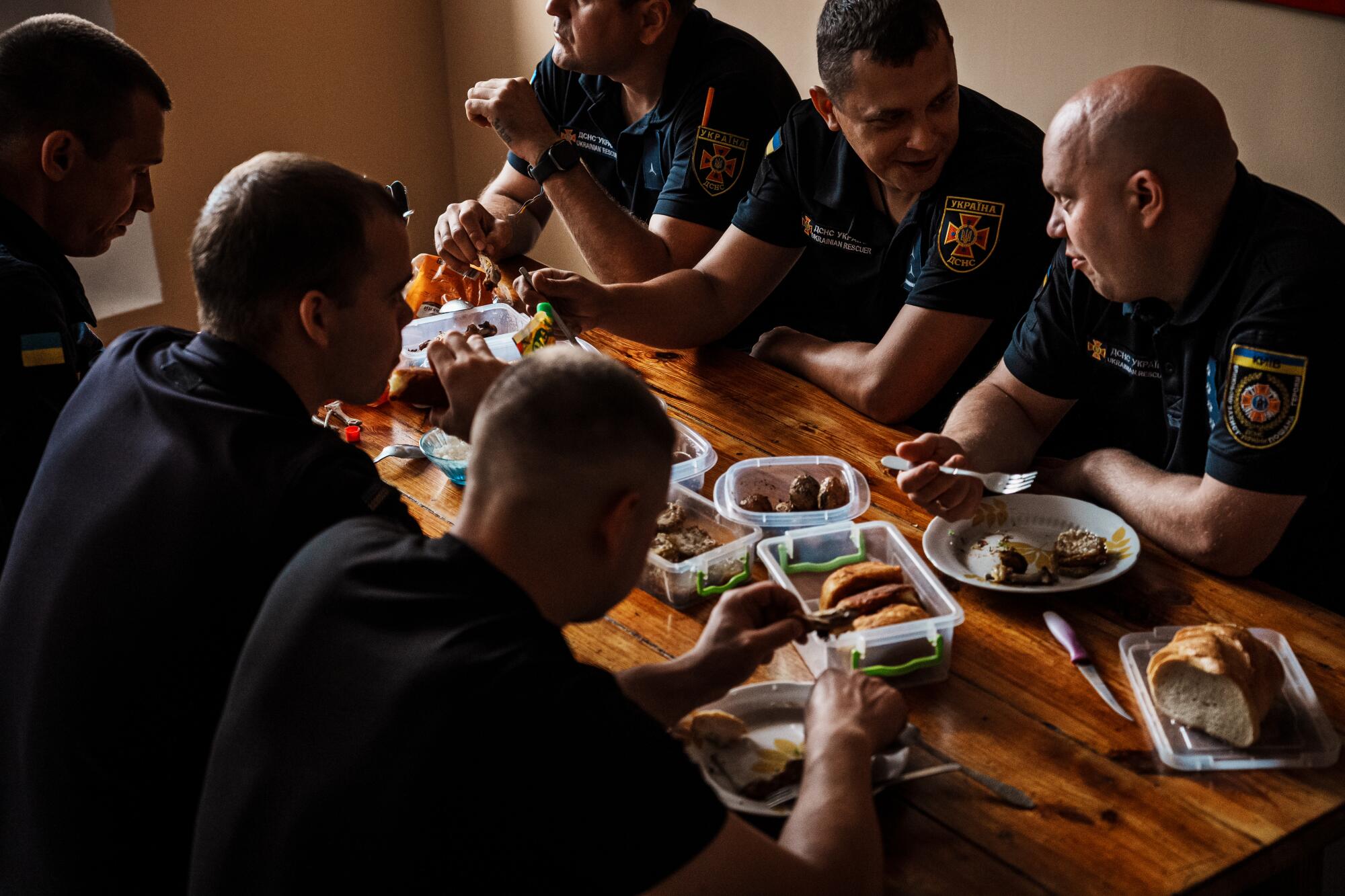
When he goes home to his own family — a wife and two children, one of them 10 and the other an infant — Ratiev, a first responder for a dozen years, doesn’t like to talk about whatever danger or tragedy he has just encountered. At most, he might relate some happy ending elliptically, without dwelling on the harrowing circumstances preceding it.
“I don’t want to bring the war home to them,” he said.
::
For everyday stress, everyone has their own personal coping mechanism: yoga, late-night snacks, walks in one of the city’s many green parks, long cafe conversations about anything except the war.
For some, there’s dancing.
Before the war, Kyiv’s club district was a magnet for revelers and ravers from across Europe. Now it is reassessing its place and identity, said music entrepreneur Harry Pledov.
With the shocking mutiny by Russia’s Wagner mercenaries put down for now, Moscow and Kyiv both work to calculate where their war goes from here.
“Some people like loud music to relax and express their emotions on the dance floor,” Pledov said as a thumping electronic soundtrack throbbed in the background. Off-duty soldiers are a particularly enthusiastic clientele, he said.
Clubbing was a no-go earlier in the war, Pledov said — “it felt too strange to do anything fun” — but over the months it has made a comeback, with more of an emphasis on fostering community togetherness and donations to the armed forces and war-related charities.
Because overnight curfew hours and predawn air alerts coincide with what were once prime club hours, the dancing commences about 6 p.m., when the summer sun is still bright.
“Night is day now, and day is night,” Pledov said.
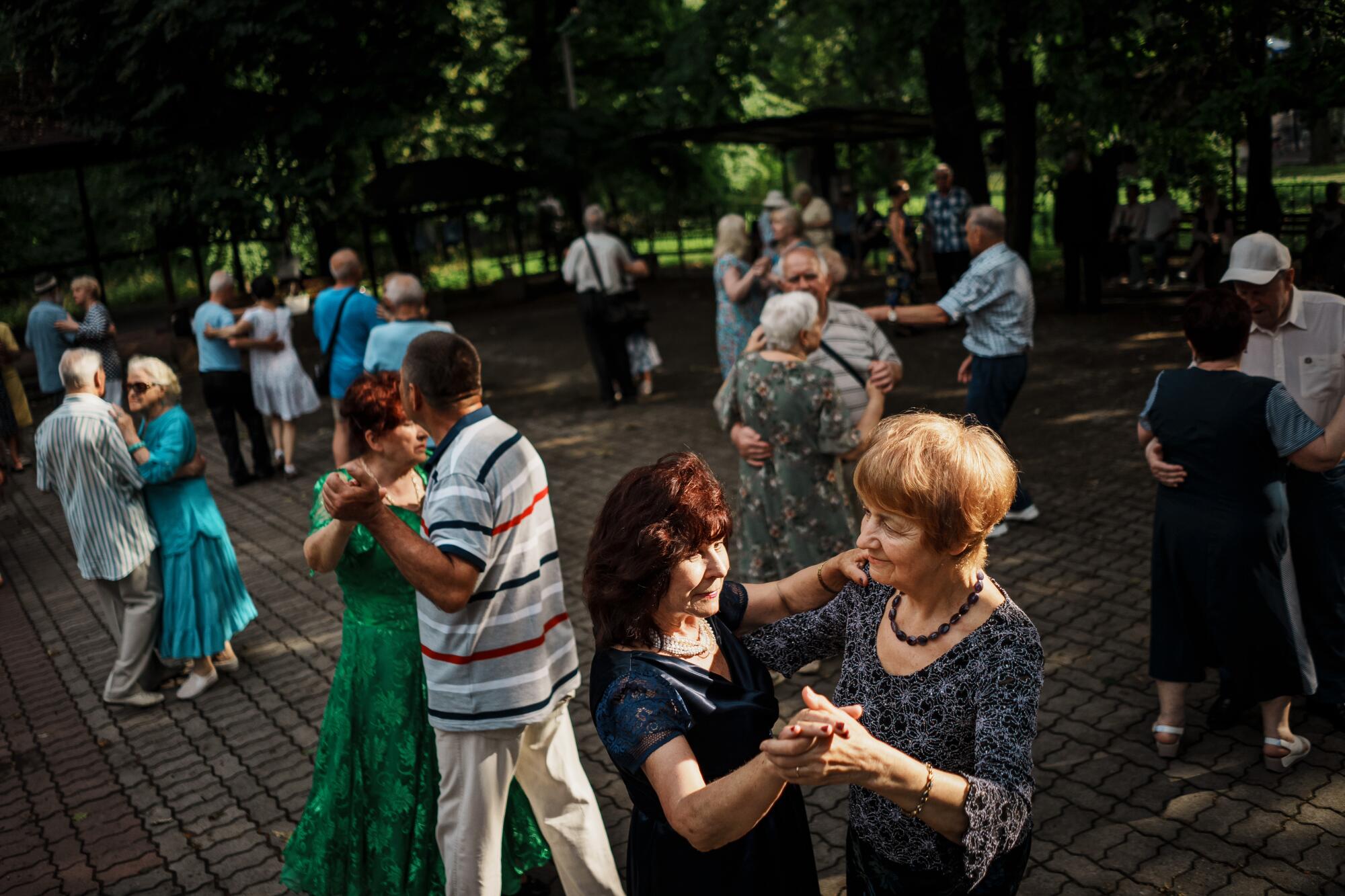
Across the Dnipro River and at the other end of the generational spectrum, weekend evenings see an outdoor gathering of Ukrainian seniors dancing to oldies, a tradition that predates the war by decades. In winter, the dipping and twirling take place inside a spacious downtown Metro station; in the summer, the elders take over a tree-shaded park pavilion.
To the strains of vintage pop tunes or traditional music — sometimes live, sometimes recorded — romance sometimes blooms among those old enough to remember past wars and hardship.
“It was fate that we found each other here,” said Mykhailo Yahol, a dapper 85-year-old, beaming at his 70-year-old girlfriend, Marysia Hornishevska, who nodded her snowy head in assent. Both are widowed; they met five years ago in this park, at a dance evening like this one.
“When I hear bombs falling down on the city, I feel dizzy,” said Yahol, who was a toddler when Kyiv came under Nazi occupation during World War II. “You don’t forget about the war when you’re here, dancing, but you’re distracted. For a bit, at least.”
::
From inside their 11th-floor apartment, when an enormous boom reverberated shortly before 3 a.m., Elena Stzelchenko, 38, and Andriy Zhuravel, 40, didn’t realize at first that their own building had been hit.
“We thought maybe it was a factory nearby,” she said. “Then we smelled the smoke.”
Seven floors above them, missile debris tore through the outer walls of the high-rise in Kyiv’s western district of Solomianskyi, obliterating several flats and touching off a raging fire. It was days before the bodies of all five people killed in the strike were recovered.
With everyone jolted awake, Stzelchenko and Zhuravel checked on an elderly neighbor, who told them he was fine. They soothed their plump, imperious long-haired tabby and swept up the splintered drywall and ceiling tiles that littered the common entryway.
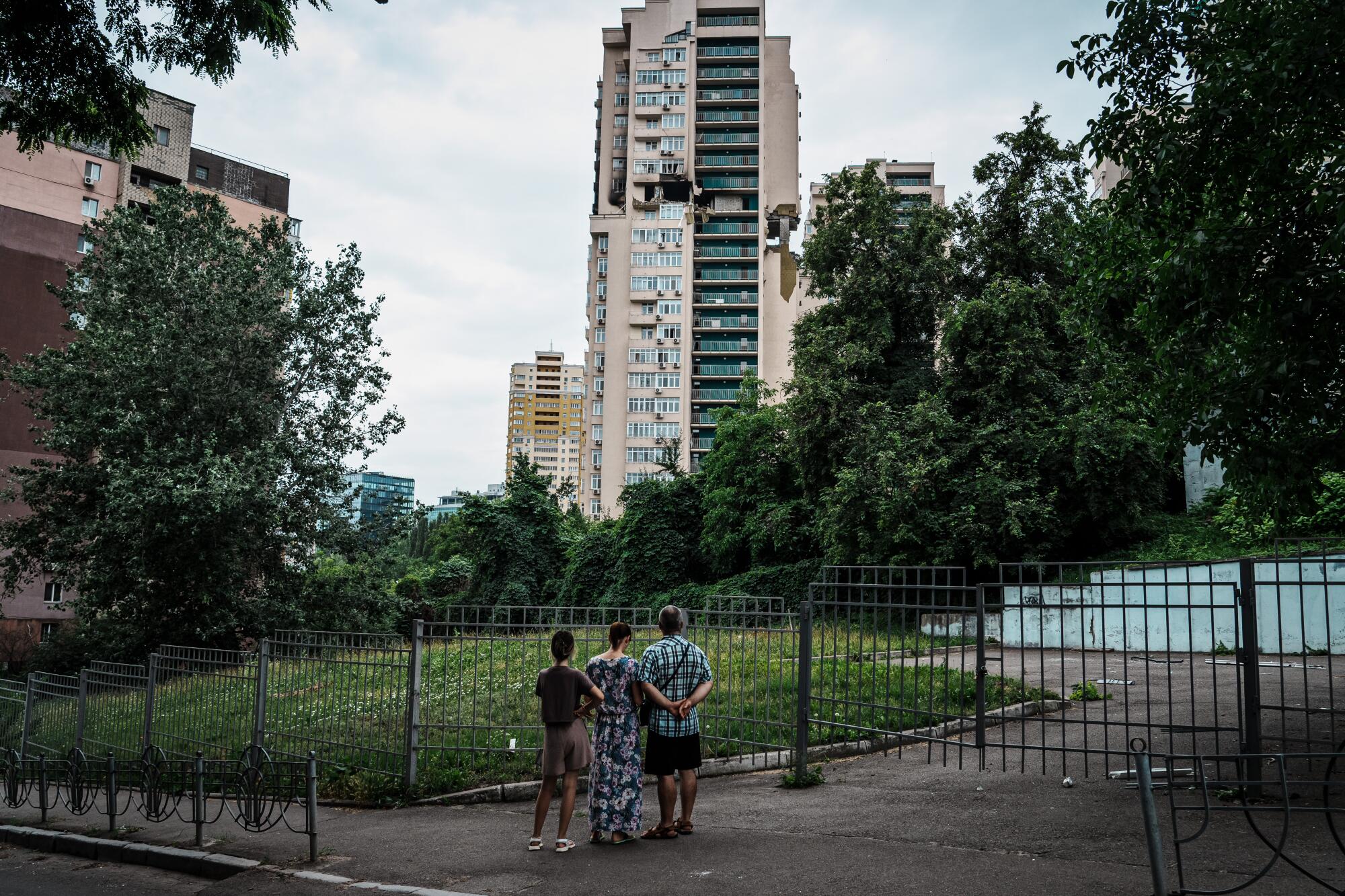
“I was already awake when it happened — I don’t even try any more to sleep at that hour,” said Yevhenii Kandyba, a 28-year-old lawyer who lives on the building’s seventh floor. “I do my sleeping after I finish with work.”
Russian President Vladimir Putin’s KGB years in East Germany offer a window into his crackdown on protests, war on Ukraine and yearning for empire.
Hours after the June 24 strike, he walked his beagle, Loki — “my small, scared friend” — down to the parking lot, waiting for emergency services at work there to let people check on their cars.
“Last night, I was happy I’d found a good parking spot!” he said. Now, even from a distance, he could see his red Mazda was covered in powdery dust, with a smashed windshield and an enormous dent.
In a city the size of Chicago, people can sometimes convince themselves that airborne catastrophe won’t find them. But sometimes, it does.
“You’re a little surprised when it’s your own building where this happens,” Kandyba said. “But on any night, you’re never surprised that somewhere in the city, something has gotten hit.”
::
It can be hard to get much sleep with a toddler in the house. That’s especially true for Ukrainian parents like Dmytro and Yulia Kravchenko, who leap to check on 18-month-old Mikhail whenever an air alert sounds.
At Kyiv’s sprawling, shaded city zoo, the little boy was wrapped in his father’s arms on a sunny Sunday as he stared first at the tiger in its outdoor enclosure, nearly hidden by shrubbery, then stretched out a hand toward snakes behind the glass in the dimly lit reptile house.
“This is all we want, for him to be happy and learning,” said Kravchenko, 37. “And safe.”
The zoo has remained open throughout months of war, taking in animals displaced by fighting elsewhere. When Russian airstrikes on Kyiv repeatedly knocked out the power over the winter, zoo officials crowdfunded fuel for a wood stove that kept the gorilla warm.
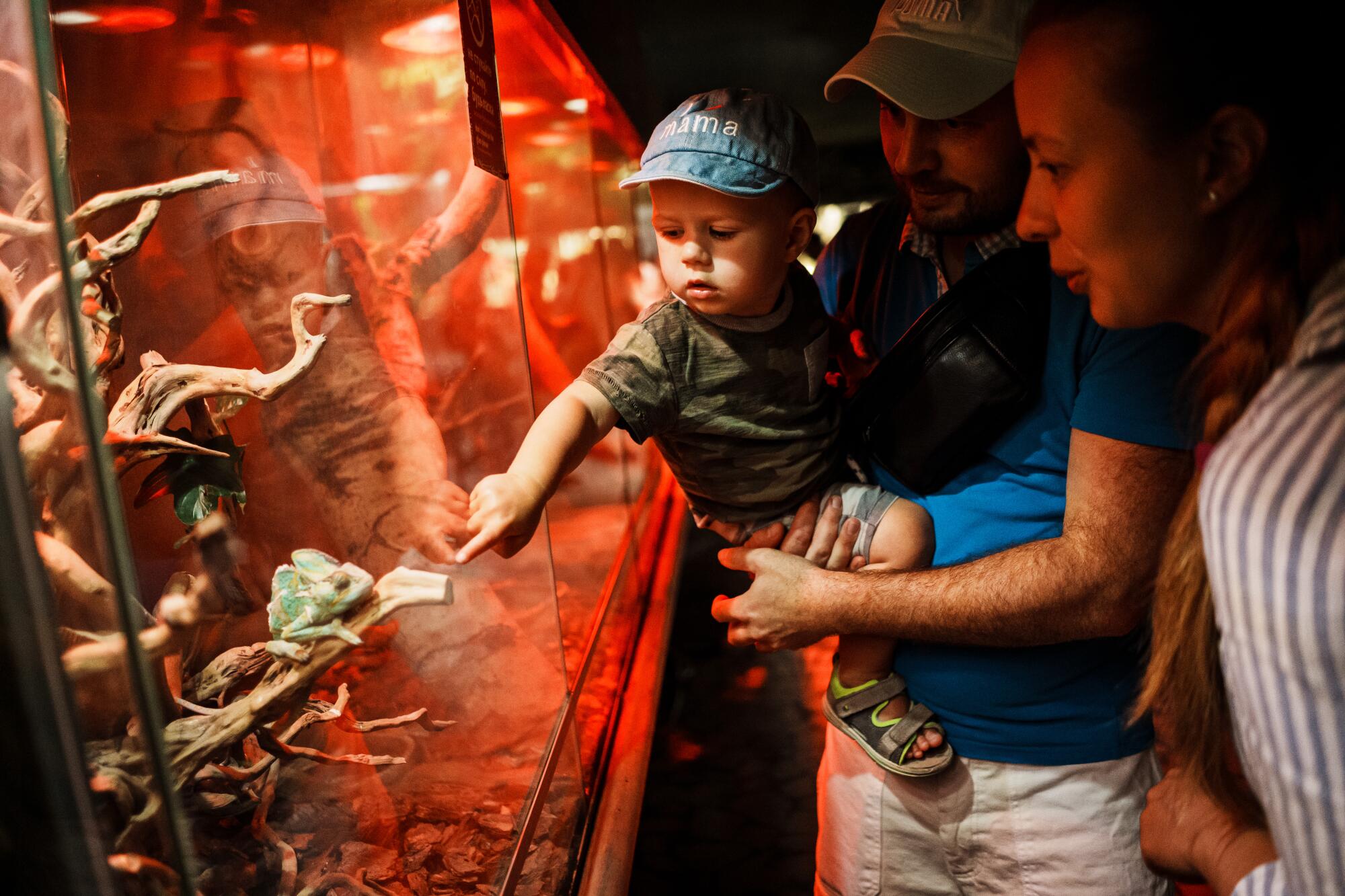
During Russian bombing, the zoo has been hit repeatedly by shrapnel, said zoo director Kyrylo Trantin. A big piece of jagged metal crashed onto the grounds during a concerted round of strikes in May, but lodged in a chestnut tree, not close to any animal enclosure, he said.
Trantin is particularly proud of Horace, the Asian elephant, who was frightened at first by air alarms, but now knows to lumber quickly into his enclosure whenever one sounds.
Russian private military contractor Wagner is busy boosting its brand as its fighters try to subdue Ukraine, trading secrecy for war propaganda movies.
“Horace is a national hero!” said Trantin, 51, who concedes that his Horace-related fandom stems in part from the fact that he got his start as an elephant keeper. When war stress gets to him, he likes to go and shovel elephant dung — it calms him down, he said.
“Our friends from all over the world are helping us,” he said. “We’ll never abandon this place, it’s too important for our morale, for our city.”
::
Kyiv’s annual book fair, the biggest in Ukraine, is held in a complex known as the Arsenal, built as a weapons depot, now a cavernous arts-event space. That history resonates with many in attendance.
The gathering had to be canceled last year, in the early months of war, but it was revived in June, with author readings and panel discussions and overflowing book booths that drew thousands of visitors — including President Volodymyr Zelensky, who dropped in with his wife, Olena.
Attendees spoke proudly of the importance of events like this one taking place, whether despite the war or because of it.
“For us, it’s a battle on the cultural front,” said Anastasia Arseniuk, a 22-year-old student at Kyiv University.
Newly published works showcased at the festival included the war diaries, posthumously published, of a well-known poet and children’s author, Volodymyr Vakulenko, who was abducted last year during Russia’s occupation of the eastern city of Izyum and surrounding villages.
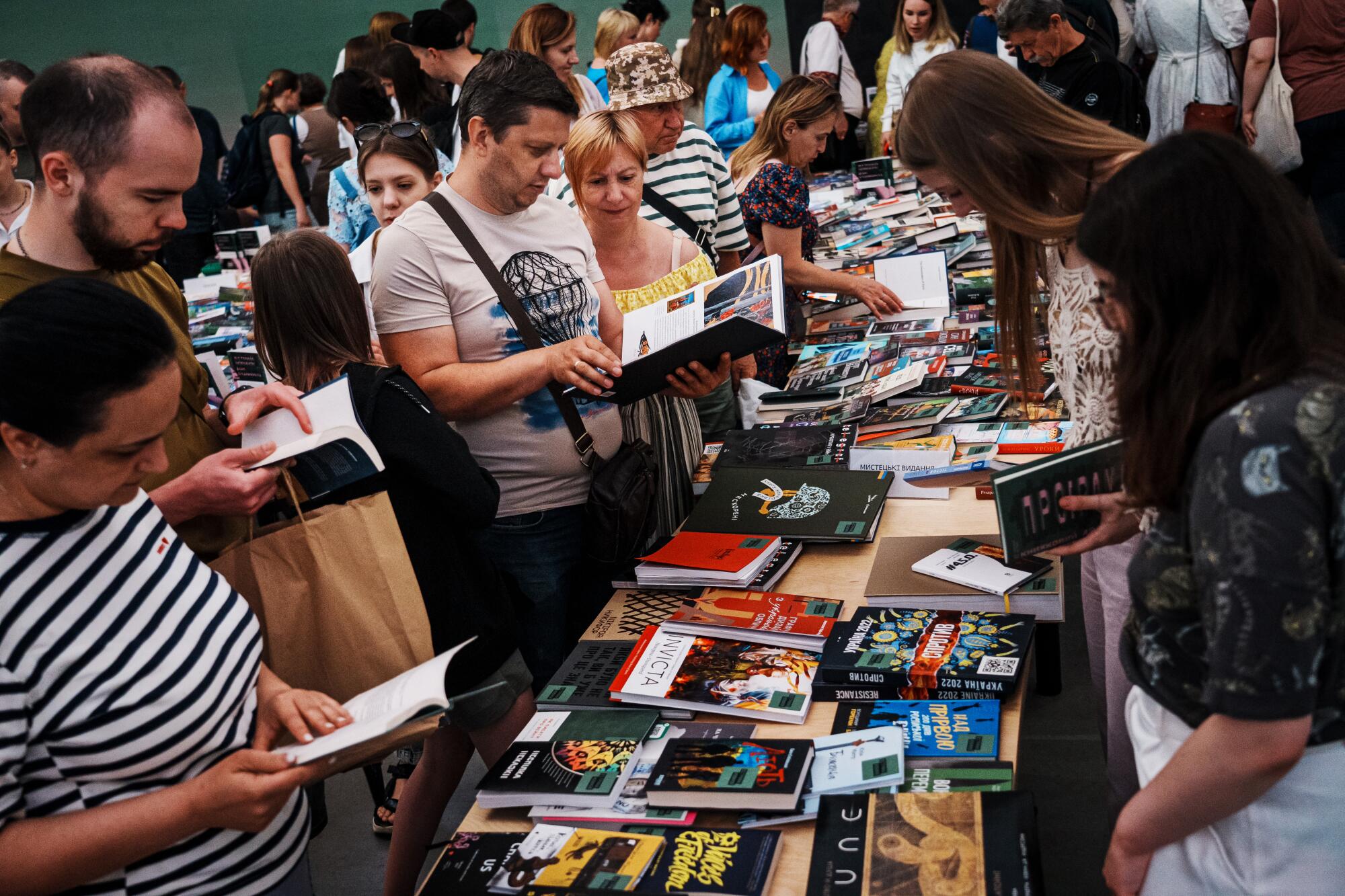
In November, his remains were unearthed in a mass grave left behind by the Russians. Later, so was his diary, and a well-known young Ukrainian novelist and poet named Victoria Amelina was instrumental in bringing it to publication, an occasion celebrated at the fair.
Only days later, the literary community shuddered to learn that Amelina, 37, who in recent months had put aside fiction to turn her attention to documenting war crimes, was among those gravely hurt in the June 27 missile strike on the pizza restaurant in Kramatorsk. On Saturday, she died of her injuries, leaving behind a young son.
The long fight for Bakhmut is backed by consumer tech — messaging apps, teleconferencing services, cloud-synced mapping software and drones.
In an eerily prescient poem, Amelina had written of the capriciousness of the threat from the skies: “An air raid across the country / each time like going to everyone’s execution / yet they aim at only one.”
Even before Amelina’s death, Valeriya Skoryk, a 16-year-old high school student volunteering as a guide at the book fair, said it was crucial not to let numbness take hold in the face of wartime loss and fear.
“Sometimes when I hear air-alert sirens, I don’t even react,” she said. “But then I say to myself, ‘I’m alive. I’m still alive.’ And so are people I love. That’s a reason to keep going.”
More to Read
Sign up for Essential California
The most important California stories and recommendations in your inbox every morning.
You may occasionally receive promotional content from the Los Angeles Times.
